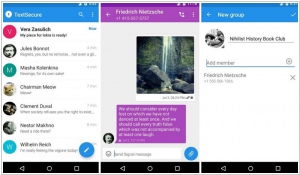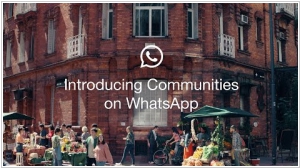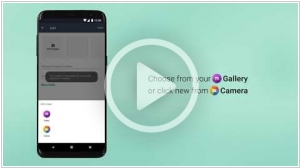Signal vs WhatsApp
June 07, 2023 | Author: Adam Levine
27

WhatsApp Messenger is a cross-platform mobile messaging app which allows you to exchange messages without having to pay for SMS. WhatsApp Messenger is available for iPhone, BlackBerry, Android, Windows Phone and Nokia and yes, those phones can all message each other! Because WhatsApp Messenger uses the same internet data plan that you use for email and web browsing, there is no cost to message and stay in touch with your friends.
Signal and WhatsApp are both popular messaging apps, but they differ significantly in terms of privacy, security, and ownership.
Signal is known for its strong emphasis on privacy and security. It uses end-to-end encryption by default for all messages, calls, and media shared within the app, ensuring that only the intended recipients can access the content. Signal collects minimal user data and has a strict privacy policy that prioritizes user anonymity and data protection. The app is open-source, allowing for transparency and scrutiny of its security practices.
WhatsApp, on the other hand, also offers end-to-end encryption for messages and calls. However, it is owned by Facebook, which has raised concerns about data privacy and security. While WhatsApp claims that it cannot access users' encrypted messages, it collects certain metadata and shares some data with Facebook for advertising purposes. WhatsApp's privacy policy has faced scrutiny in the past due to concerns over data sharing and privacy practices.
See also: Top 10 Business Messaging platforms
Signal is known for its strong emphasis on privacy and security. It uses end-to-end encryption by default for all messages, calls, and media shared within the app, ensuring that only the intended recipients can access the content. Signal collects minimal user data and has a strict privacy policy that prioritizes user anonymity and data protection. The app is open-source, allowing for transparency and scrutiny of its security practices.
WhatsApp, on the other hand, also offers end-to-end encryption for messages and calls. However, it is owned by Facebook, which has raised concerns about data privacy and security. While WhatsApp claims that it cannot access users' encrypted messages, it collects certain metadata and shares some data with Facebook for advertising purposes. WhatsApp's privacy policy has faced scrutiny in the past due to concerns over data sharing and privacy practices.
See also: Top 10 Business Messaging platforms
Signal vs WhatsApp in our news:
2024. Signal now lets you keep your phone number private with the launch of usernames
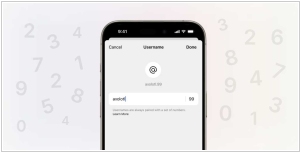
Signal is introducing usernames, a new feature that eliminates the need to share your phone number to connect with others on the platform. This update, currently in beta, will be gradually available to all users in the upcoming weeks. While Signal still mandates a phone number during registration, this move enhances privacy by allowing users to maintain their phone numbers confidential. This step reinforces Signal's reputation as a leader in secure, end-to-end encrypted messaging, as it mitigates a potential loophole exploited by hackers who could gain access to users' messages by hijacking registered phone numbers at the carrier level.
2023. WhatsApp launches its native macOS app
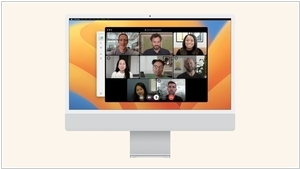
WhatsApp has introduced a new native Mac app, enabling users to engage in video calls with a maximum of eight participants and audio calls with up to 32 individuals. The redesigned app is tailored to Mac users, facilitating increased productivity on larger screens. Notably, users can seamlessly share files through drag-and-drop functionality in chats and access a more extensive chat history. After a period of testing, WhatsApp released the app in public beta earlier this year, making it available to users with Apple Silicon systems and macOS 11 Big Sur or later.
2023. WhatsApp introduces a new Windows client with better calling features
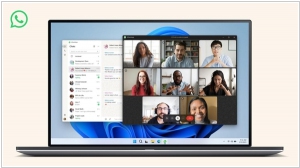
WhatsApp has unveiled an upgraded Windows client that boasts enhanced calling features and improved performance. With the latest version, users can stay connected even when their phone is inactive, thanks to multi-device synchronization. The desktop app now also enables group video calls for up to eight people and audio calls for up to 32 participants, on par with the mobile application. Furthermore, WhatsApp plans to expand the number of people allowed in a group call. In light of its multi-device linking capability that allows one account to be used across various devices, the company has been focused on enhancing its desktop experience.
2022. WhatsApp's new Communities tool sounds a lot like Slack
WhatsApp has introduced a new feature called "Communities," which enables users to create groups within the app for specific organizations or groups, such as schools or apartment buildings. These communities will have sub-groups where members can discuss specific topics, and administrators will have the ability to send announcements to all members. The concept of communities on WhatsApp bears resemblance to Slack, a popular messaging platform in the digital workplace. Along with the introduction of communities, WhatsApp is implementing some additional changes to its Groups feature that also resemble Slack's functionality. Notably, users will now be able to express themselves through emoji reactions, and audio calls will accommodate up to 32 participants. The file sharing size limit has been increased to 2 GB, and group administrators have the ability to delete messages. These updates bring enhanced functionality and versatility to the WhatsApp platform.
2021. Signal expands encrypted group video calls to 40 people
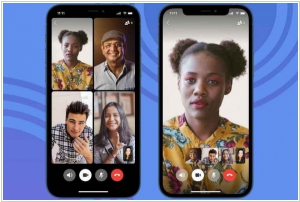
The messaging app Signal has expanded its group video chat capabilities to accommodate up to 40 participants, a significant increase from the previous limit of five. Importantly, the end-to-end encryption feature remains intact, ensuring that only the participants in the call have access to the messages or video content. This means that neither the messaging provider, government authorities, nor hackers can view the calls, unless a participant grants them access to the video session or compromises your device's security.
2021. WhatsApp brings its Business API to the cloud to speed adoption
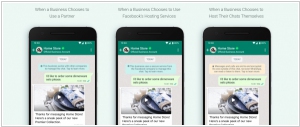
WhatsApp is introducing a new version of its WhatsApp Business API, which will now be hosted on Facebook's infrastructure in the cloud. According to the company, this shift will significantly reduce the integration setup time from weeks to just minutes. As a result, businesses can swiftly transition to WhatsApp's API platform and effectively communicate with their opted-in customers. Over the past few years, WhatsApp has been expanding its Business API to create a significant revenue stream from its otherwise free messaging service. Presently, businesses pay WhatsApp on a per-message basis, with rates varying depending on the number of messages sent and the region. Currently, numerous large enterprises, including Vodafone, Coppel, Sears Mexico, BMW, KLM Royal Dutch Airlines, Iberia Airlines, Itau Brazil, iFood, and Bank Mandiri, have already adopted the existing API (non-cloud based) to enhance their operations.
2021. WhatsApp adds voice and video calling to desktop app
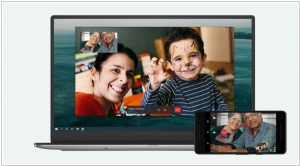
Support for voice and video calling is being introduced to the desktop app of WhatsApp for Mac and Windows. Initially, this feature will only be available for one-to-one calls, but the company plans to expand it to include group voice and video calls in the future. The video calls are designed to work seamlessly in both portrait and landscape orientation. Additionally, the desktop client will always remain on top of other windows, ensuring that video chats are never lost amidst a browser tab or a stack of open windows. WhatsApp conducted tests for this feature with a small group of desktop users last year.
2020. Signal adds encrypted group video calls
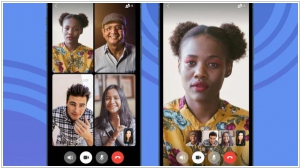
Signal, the popular encrypted messaging app known for its commitment to privacy and security, has introduced a new feature: end-to-end encrypted group video calls. This feature allows up to five participants to engage in a video call within a Signal group, providing seamless connectivity and flexibility. Unlike Facebook's Messenger Rooms, Signal ensures that all group video calls are end-to-end encrypted, prioritizing the privacy of its users. Initiating a video call in an existing Signal group is as simple as tapping the video icon located in the upper-right corner of the screen. Once the call has started, group members can freely join or leave the call at any time, enhancing the convenience and accessibility of group communication.
2020. WhatsApp finally launches payments
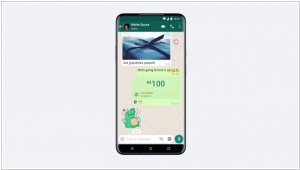
WhatsApp has made an announcement that users in Brazil will have the privilege of being the first to send and receive money through its messaging app. This will be made possible by utilizing Facebook Pay, the payments service launched by WhatsApp's parent company, Facebook, last year. The payments service is currently free for consumers, meaning there are no commission fees involved. However, businesses will be required to pay a 3.99% processing fee to receive payments. To complete transactions, users will need to enter a six-digit PIN or use their fingerprint. To use the service, you need to connect your WhatsApp account with your Visa or Mastercard credit or debit card. Initial local partners for this service include Banco do Brasil, Nubank, and Sicredi. Additionally, Cielo, a payments processor, is collaborating with WhatsApp to facilitate transactions. The company stated, "We have created an open model to allow for the inclusion of more partners in the future."
2019. WhatsApp adds business catalogs
WhatsApp is enhancing its business app by introducing a new feature called "catalogs." This feature enables businesses to present and share their products and services with potential customers. Interested customers can explore product photos, view prices, and read descriptions to make informed purchase decisions. These catalogs function as convenient mobile storefronts on WhatsApp, eliminating the need for a dedicated web page. Business owners can effortlessly create catalogs by accessing the Catalog option in the app's settings, uploading product photos, and providing relevant details, including optional product or service codes.

